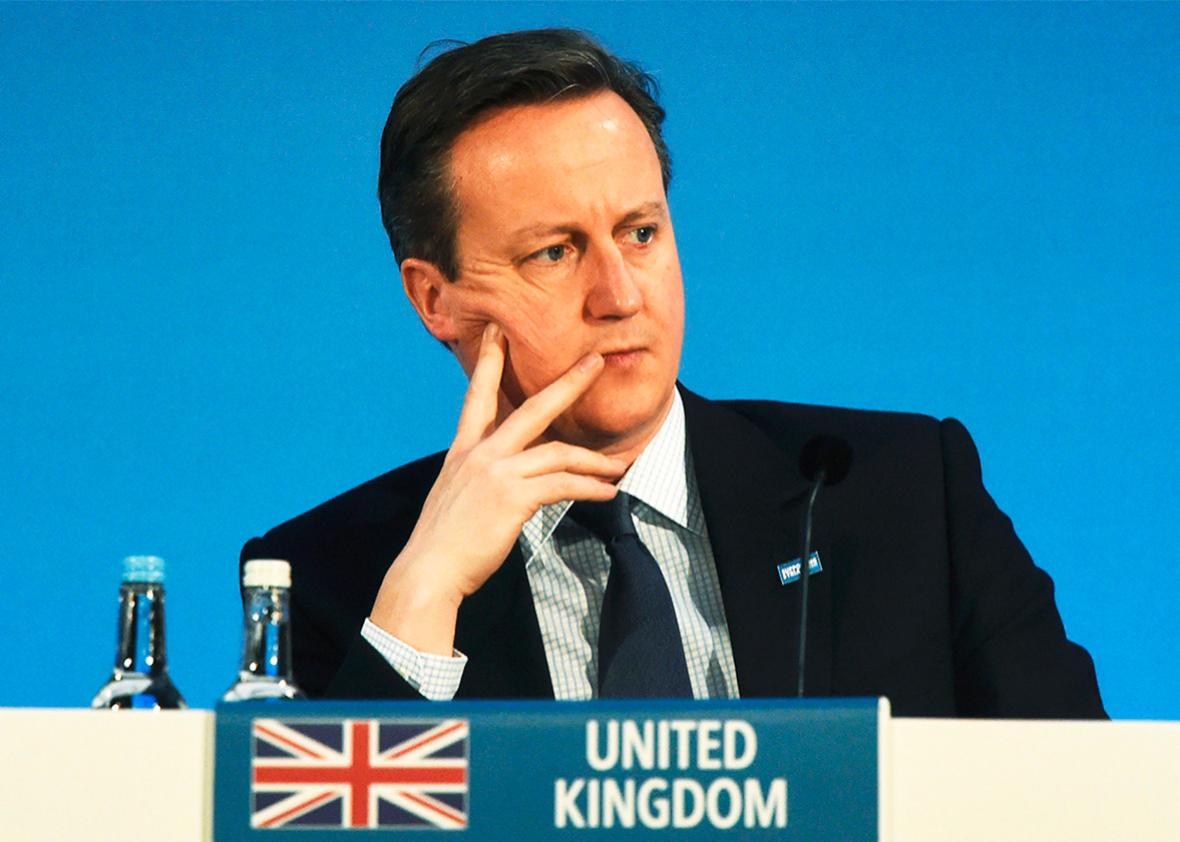If the British people vote to end their country’s relationship with the European Union in a referendum, the world will not end. The sky will not come crashing down to Earth; the oceans will not submerge the land. Or at least we think they won’t. Because in actual fact, we have absolutely no idea what will happen.
This extra dollop of uncertainty in an uncertain world has been brought to us by British Prime Minister David Cameron, and the origins of the current problem go back a few years. To quell the anti-European feelings in a part of his Conservative Party, and to ward off a challenge from the U.K. Independence Party, Cameron promised that if he were re-elected in 2015 (which for a time looked unlikely), he would renegotiate the terms of British membership and then hold a referendum on British membership to the EU.
From the beginning, it was clear that the renegotiation would be nothing of the sort. Britain is already exempt from the Schengen treaty, which eliminated borders in much of Europe, and it isn’t a part of the euro currency or the banking union. Because the rest of Europe is right now coping with an extraordinary tide of refugees, a political and military challenge from Russia, and the ongoing economic crisis in Greece, nobody was ever going to reopen discussion of the major treaties that govern Europe’s “single market,” the continent-wide free trade zone, of which Britain is any case a major beneficiary.
Instead, Cameron asked for, and has now just received, a number of promises—Britain will not be forced to join a European political union, which isn’t happening anyway—plus an ugly little “opt-out” from EU laws: Europeans working in Britain will receive fewer benefits than British citizens. The response has been unsurprisingly negative. “Tinkering with the small print” cried the Daily Mail. An “establishment stitch-up” said a headline in the Daily Telegraph. With that exercise out of the way, the referendum campaign was launched. The vote may take place as soon as June. Opinion polls show the result could go either way.
What could happen if Britain votes to leave? As I said, we don’t know. It might have to drop out of Europe’s single market, in which case the British would pay more to trade in Europe. Several large companies have already declared that if that happens, they will leave. Alternatively, Britain might stay in the single market, but lose the right to influence EU regulations and be forced, as others are, to abide by them anyway. Presumably Britain would no longer be a part of EU trade negotiations and treaties, so would have to launch all of those from scratch. In any case, laws on employment, contracts, tax, and intellectual property would all be affected, and the legal wrangling will go on for years. “Law firms prepare for Brexit bonanza,” declared a recent headline in the Financial Times.
But the consequences would not be purely economic. If Britain were outside the EU, it would surely cease to be part of any form of common European foreign policy. As I’ve written elsewhere, Europe’s voice has grown notably weaker over the past couple of years, not least because Britain, preoccupied with its own problems, has scarcely been able to interest itself in foreign countries. A dramatic British exit would necessarily weaken Europe’s ability to speak unanimously even further. Will it be possible for the EU to formulate a joint policy toward Russia if Britain is not in the room? Will the sanctions on Russia be maintained? Possibly not—but again, who knows?
As for further consequences—choose your favorite scenario. Scotland is far more pro-European than England; an abrupt British exit could give the Scottish nationalist movement the boost it needs to leave the United Kingdom. The French nationalist leader, Marine Le Pen, also wants France to leave the EU, as well as NATO; a British exit could give her the momentum she needs to take power. The Russian President Vladimir Putin has been fighting EU solidarity for years; a British exit could help make the European continent safe for corrupt Russian money and renewed Russian aggression, too.
In other words, it’s not hard to imagine how we get rather quickly from here to a world in which there is no longer a U.K. or an EU, and possibly not much of a transatlantic alliance either. Alternatively, the British might indeed vote to stay in Europe. And then we return to the ordinary levels of extraordinary uncertainty to which we are all now accustomed.
